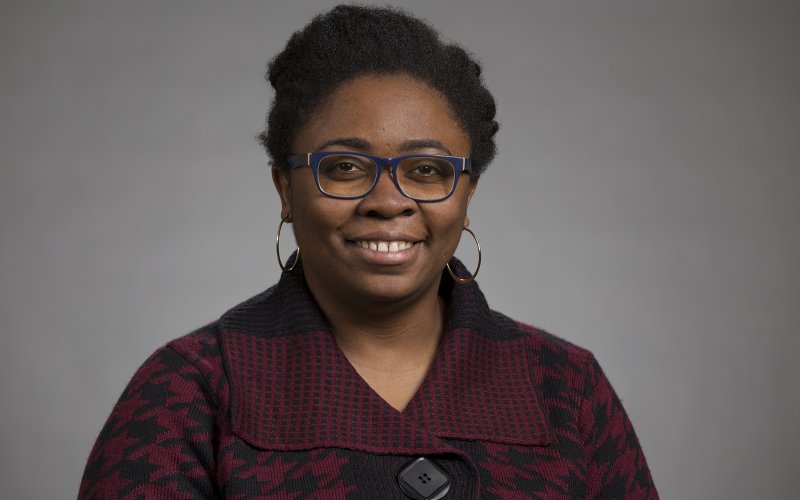Ekenna’s Research Tackles Robotics, Mathematics and Malaria

ALBANY, N.Y. (May 11, 2021) – When Chinwe Ekenna was growing up in Nigeria, she frequently found herself the lone female taking high-level mathematics courses. When others expressed doubt about her ability to keep up with the more advanced coursework, Ekenna was driven to prove them wrong.
Now an assistant professor of computer science at the College of Engineering and Applied Sciences, Ekenna is a faculty advisor for UAlbany's student chapter of the Association for Computing Machinery-Women (ACM-W) and participates in public engagement activities which encourage young women in science, technology, engineering and mathematics (STEM).
“I had a passion for STEM courses while in high school,” said Ekenna, noting that her classes were often termed "difficult" and therefore not female-inclined. But this only served to further spur her on her chosen path. “I developed the drive to continue in this direction during my undergraduate studies at Covenant University in Nigeria, where I studied for a computer science degree, and here I am now teaching and conducting research in a STEM profession.”
Ekenna’s research centers on intelligent motion planning applied to robotics and proteins. She has explored adaptation of robotic motion planning to improve planning time and topological data analysis methods to capture important features of robot planning spaces.
At UAlbany’s April Research Coffee Hour series, Ekenna discussed how intelligent motion research has been applied in trajectory planning for unmanned aerial vehicles (UAVs). While the field has advanced towards handling high dimensional and complex spaces, it’s still a challenge to generate feasible robot configurations or determine how much sampling is needed to ensure that a path, if it exists, is formed. Ekenna’s work centers on developing topological tools to help explore, measure, and provide an upper-bound on the number of nodes needed in a given robot environment to produce a roadmap.
And as she did during her formative years, Ekenna continues to embrace a wide range of research interests, including machine learning, computational geometry, and computational biology.
Along with her work in robotics, she has also focused efforts on improving the research and development of drugs designed to treat malaria, which still kills some 400,000 people per year across the globe – mostly children under the age of five – despite being a preventable and treatable disease.
“Malaria is a deadly disease and even though it is well known and an ‘old’ disease, it still outpaces other diseases for the number of deaths it causes around the world,” said Ekenna. “This is because it has a high rate of drug resistance and the parasite that causes it goes through a life cycle that evolves rapidly. The differing strains can be seen from Africa to Thailand, and treatment becomes more challenging when we consider the fact that only a subset of 3D structures of proteins in the genome is known.”
Ekenna points out that the bottleneck to the exploration of these proteins as possible drug targets that could affect the function of the parasite is that the wet lab experiments are non-trivial and time consuming. Computational and machine learning approaches can help increase the speed of this drug target investigations. She hopes her research can help streamline the 3D structure mapping and using it with small molecules.
“Vaccine development has flopped horribly for malaria and the most effective drug are still small molecules,” said Ekenna “The aim of my work is to develop and optimize machine learning methods using malaria as a model to help solve the problem of drug development for malaria. This will be developed to be transferable to other diseases.”
Ekenna received her PhD from Texas A&M University with research focused on Robotics and Computational Biology. At UAlbany, she works with a diverse group of research assistants as director of the Robotics Algorithm and Computable Systems (RACS) Lab.
While charting her own research path, she also remains focused on fostering opportunities, particularly for young women, in STEM fields. As the faculty advisor for the ACM-W women in computing group, she remains a strong advocate for equity and inclusiveness in the workplace, life and learning environments.
Her advice to young women who find themselves faced with people who doubt their capacity to learn?
“Just keep striving with what you believe and don’t let anyone intimidate or make you feel less than your worth,” said Ekenna. “Build your technical capacity and social network and never be afraid to reach out for help from like-minded people. Finally, find a mentor – someone who believes in you, gives you good advice, and is also a listening ear when you need it.”
For a growing group of future STEM professionals, Ekenna has become just such a mentor.




